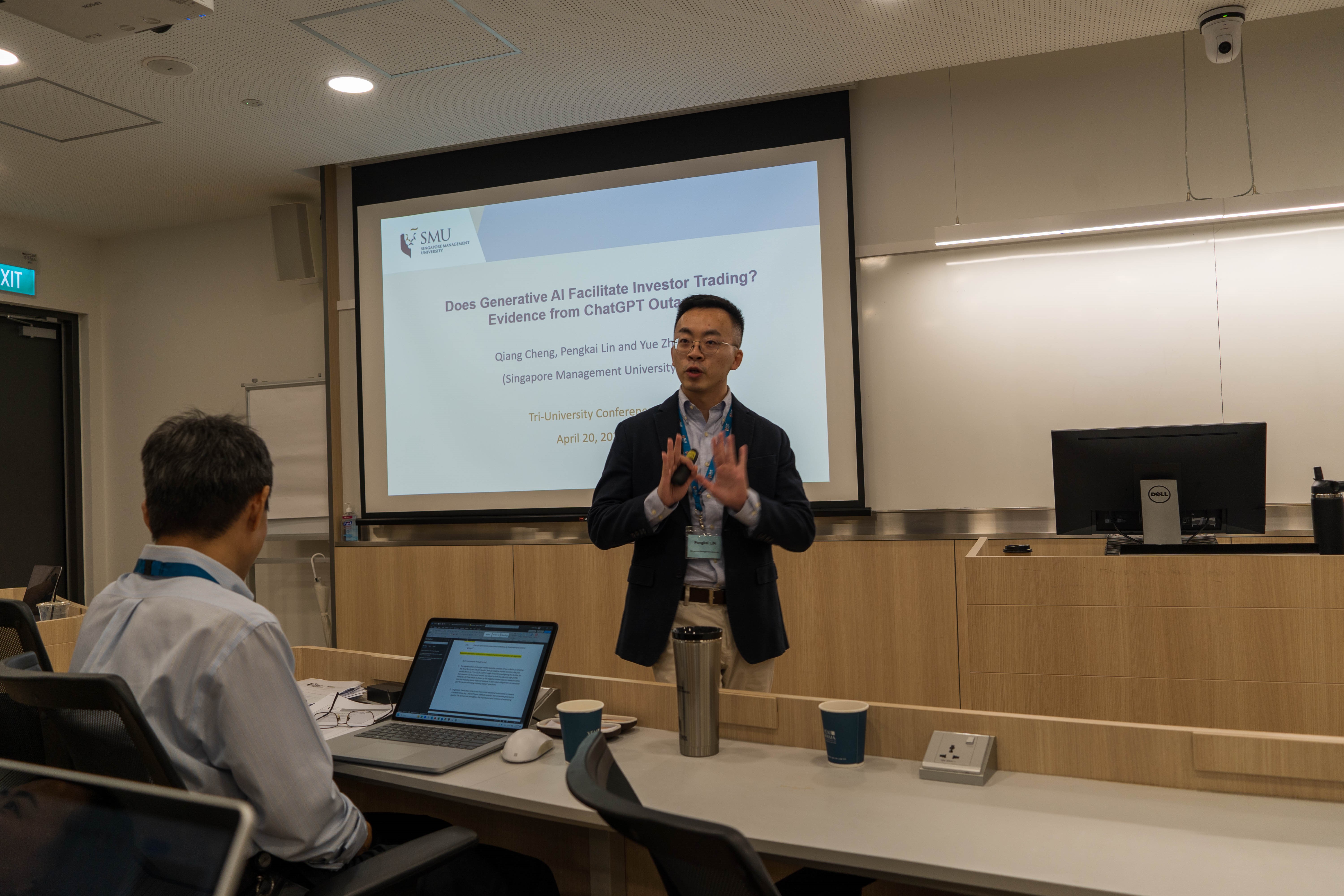
The economy has always been shaped by the perceptions and reactions of stakeholders to information. Today, technology has facilitated access to a broader range of knowledge, impacting these viewpoints and choices. But despite the wealth of information at our fingertips, information bias still exists – after all, we humans only have limited capacity to process the knowledge available to us.
With the onset of generative artificial intelligence (GAI), we are now seeing the way we interact with information change in unprecedented ways.
Two papers presented by Singapore Management University (SMU)’s faculty touched on these pertinent areas: Examining local-thinking bias and gaining empirical evidence about whether it is an impediment to market-price formation; as well as investigating whether generative AI facilitates investor trading.
The papers were presented at the Tri-University Accounting Research Conference 2024, which was hosted by National University of Singapore (NUS) on 20 April 2024, and was attended by faculty from Nanyang Technological University, NUS and SMU.
The annual conference aims to promote Assistant Professors’ research, providing a platform for the lively exchange of ideas and feedback between junior and senior faculty.
Other papers presented at the conference covered subjects ranging from corporate social responsibility risk, audit quality and more.
Local-thinking bias and how it affects analysts’ decisions
.jpeg)
People naturally have a tendency to make decisions based on available information. After all, it is difficult to pay attention to what we do not know. This was the main focus of the first paper, which was presented by Wei Ting Loh, Assistant Professor of Accounting from SMU’s School of Accountancy.
Simply titled “Local-Thinking Bias”, Professor Loh co-authored the paper with Professor Ed deHaan from Stanford Graduate School of Business as well as Professor Charles Lee from University of Washington.
The authors sought to investigate local-thinking bias within the context of how it affects equity research analysts – specifically, to provide evidence on how overreaction to such “local” information affects the market.
“For this study, we focused on the individual analyst. We are focused on how individuals who exhibit local-thinking bias can evaluate the same external information with predictably different errors.”
The findings show that analysts do indeed overreact to their local information, while simultaneously under-reacting to news from firms outside of their own portfolios – which shows evidence that local-thinking bias exists, and market prices tend to follow these overreactions. Most studies prior to this had seemed suggest that analysts are chronically inattentive and under-react to a wide variety of signals.
Elaborating, Professor Loh said, “Against this backdrop, we show that analysts are better characterised as being selectively attentive – that is, they are highly attentive to local news, while paying insufficient attention to news from firms they do not cover.”
How generative AI has affected investor trading
In the afternoon, Pengkai Lin, Assistant Professor of Accounting, presented his paper, titled “Does Generative AI Facilitate Investor Trading? Evidence from ChatGPT Outages”.
The paper was co-authored alongside Qiang Cheng, Lee Kong Chian Chair Professor of Accounting, and PhD candidate Yue Zhao from SMU’s School of Accountancy, and investigated the extent to which investors rely on Generative AI (GAI) – like ChatGPT – for trading purposes, and the associated impact on stock price informativeness.
.jpeg)
“Survey evidence suggests that certain fund managers have used ChatGPT to produce marketing text, process textual documents, draft emails and reports, as well as for coding assistance,” Professor Lin explained in his introduction.
During his presentation, Professor Lin explained the two camps that exist when it comes to GAI; one embraces its utility and its ability to simplify tasks, while the other has concerns over erroneous, inconsistent or unchecked responses from GAI as well as the risk of data leakage when using GAI.
The authors examined the stock trading volume during ChatGPT outages, and found a significant decline during these periods. Furthermore, the effect was stronger for firms with corporate news announced right before or during outages. The authors further documented a decrease in informed trading activities during outages.
The findings uncovered a significant drop in trading volume during the outage periods – a fact that indicates the significant use of ChatGPT by investors for trading purposes. “We further observe more pronounced effects for investors with greater information-processing demands and for non-retail investors,” Professor Lin added.
These results support regulators’ concerns that malfunctions in AI models could potentially disrupt financial stability. In addition, it also serves to contribute to the emerging literature that examine GAI and ChatGPT’s effects, as well as the broader research investigating the use of technology in capital markets.